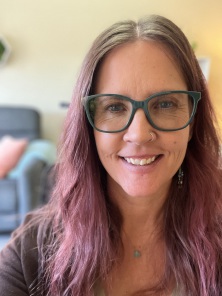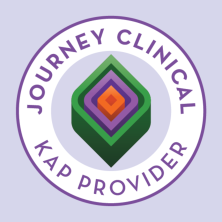
Ketamine-Assisted Psychotherapy
Interested in learning about ketamine and ketamine-assisted psychotherapy?
Below, you'll find many answers to your questions about what ketamine is, what it feels like, how it can help you, the process of the sessions and the costs.
What is Ketamine?
Ketamine is a legal, safe, and effective medicine used to treat a variety of mental health conditions, including depression, anxiety, and PTSD. Ketamine has a long history of safe use as an anesthetic in a medical setting, due to its lack of respiratory suppressing effects. Ongoing research shows ketamine produces rapidly acting antidepressant and mood-enhancing effects, which can begin to take effect within 1-2 hrs. after treatment. It works by blocking the brain’s NMDA receptors as well as by stimulating AMPA receptors, which are thought to help form new synaptic connections and boost neural circuits that regulate stress and mood. Ketamine has also been shown to enhance overall neuroplasticity for more sustained symptom improvement. Ketamine can be administered in a variety of ways, including IV infusion, intramuscular (IM) injection, via nasal spray and using sublingual/oral lozenges - sometimes referred to as troches. For your sessions, we will use sublingual/oral lozenges, prescribed to you by a psychiatrist or MD.
How does ketamine feel?
The effects of ketamine, which most patients find pleasant, last for approximately 45 to 90 minutes. These effects can facilitate shifts in perception that can often feel expansive in nature. Ketamine often softens defenses, allowing for gentle, deeper access to traumas and subconscious material in need of healing. People report a variety of insights and experiences, such as feeling outside of the self, seeing things from a different perspective, or feeling a sense of oneness--what would be termed a “mystical” or spiritual experience. We are trusting the medicine and your inner healing wisdom to bring up what you need in the moment - what needs to arise will arise.
Ketamine’s antidepressant effects are cumulative, so you may find that you achieve the most benefits with 4-8 session
Why use ketamine lozenges in the context of therapy, instead of going to an IM or IV clinic?
Taking ketamine in a therapy session makes sense because the material and insights that emerge may be related to relationships, spirituality, traumatic memories, symptoms of anxiety, depression and ptsd. Your therapist can help you understand, integrate and process that information during and after your ketamine journey. KAP sessions are typically far less expensive than IM or IV treatments, and so are more accessible. And although IM and IV treatments can be beneficial for alleviating symptoms, these treatments often do not include the emotionally supportive environment of a therapy office, or the ability to process a sometimes intense or confusing experience safely, with a psychotherapist.
Who Should not Take Ketamine? People with:
- Untreated high blood pressure
- Untreated hyperthyroidism
- Epilepsy or seizure disorder
- Heart disease
- Addiction to ketamine
- Untreated mania
- Schizophrenia, psychosis
- Active suicidality
Common Experiences During a Ketamine Treatment Session:
Dissociation: A sense of detachment from one’s body, emotions, or surroundings. Some people may experience a feeling of floating, or an altered perception of time and space.
Altered perceptions: Colors may appear more vibrant or muted, sounds may be amplified or muffled, and physical sensations may feel more intense or muted.
Visual and auditory hallucinations: Ketamine can cause vivid and sometimes intense hallucinations, such as seeing geometric patterns, or hearing messages.
Emotional experiences: Ketamine can evoke a range of emotions, including euphoria, tranquility, compassion, sadness, fear and grief. Some people may feel like they have gained a new perspective on their emotions or experiences, or they may experience a sense of connection with others or the universe. You may also feel confused or intrigued by some of your experiences, which is where the importance of integration comes in.
The Roadmap to Your Ketamine-Assisted Psychotherapy (KAP) Sessions:
I partner with a psychiatric organization called Skylight Psychedelics who provides medical support and the ketamine lozenge prescription, while I take on the therapy piece of your treatment. You also have the option to ask your own psychiatrist to prescribe ketamine lozenges for your KAP sessions.
After you have been approved for a ketamine prescription through Skylight or your own psychiatrist and complete a psychotherapy intake with me (if you are a new client), at least 2-3 preparation sessions are held before your 3-hour ketamine session. In these sessions we will discuss your hopes, fears, and expectations for your ketamine session. We will also discuss set and setting for your experience, talk about your intentions, develop affirmations, discuss challenging emotions, build grounding and calming skills, and plan for integration.
During the ketamine session itself, you will take your own vitals with my blood pressure cuff so we can make sure your blood pressure is within a normal range. You’ll settle into my reclining couch with a cozy blanket as we talk about your goals and intentions, and you will then take the ketamine and wait for the effects. The taste is bitter and your mouth will feel numb, and during this time I'll play soothing music for you, read you your favorite poetry, lead you through a relaxing guided meditation, and remind you of your affirmations and intentions. You may notice that the effects of the ketamine come on quickly, with a sensation of light-headedness or dizziness.
Many people are silent during their journey, while some people choose to talk about what they are experiencing--both are completely fine! While you are on your journey, my role is to hold space for you, providing an emotionally supportive presence as I sit in silence with you and/or listen to you.
Once the effects of ketamine subside, we’ll spend the remainder of our appointment giving you space to integrate, process, and discuss your experience. The integration portion of the session is important because it gives us a chance to pull together the insights and themes of your experience and talk about how you can use them in your daily life. Together we will work to understand your experience on a deep level so that you can continue to work towards developing healthier habits and beliefs about yourself and others.
After your session, you may be hungry and thirsty, and I’ll have some snacks and water/tea/hot cocoa for you. By the end of the session, you should feel back to your usual self, though you may feel somewhat spacey and tired. For these reasons, it’s important to have a trusted person pick you up to bring you home, and you shouldn’t drive for at least 6 hours after ingesting the ketamine. We will have a chance for further processing in your next integration/ketamine preparation session.
What’s the Cost of KAP?
I charge a low, flat rate of 150.00/hour, so the 2.5-3 hr. KAP sessions are typically 375.00-450.00, while the 1 hr. intake, preparation and integration sessions are typically 150.00 (or less, if you'd like to use your insurance).
You’ll also need to pay the co-pay or out-of-pocket fee for your psychiatrist, as well as the fee for the ketamine itself.
Can I use my Insurance?
You may be able to use your insurance to partially cover your dosing session and your intake, preparation and integration sessions. Be sure to ask if I can accept your insurance.
How many sessions should I have?
Since ketamine has a cumulative effect, it’s recommended (though not required) that you have a total of around 4-8 sessions for maximum benefit. Your psychiatrist will help you determine how to space your sessions and which dosage will be best for you. If you are a new client without another therapist, we'll meet for at least 3, 55-min. sessions before your ketamine session (for intake, rapport building, preparation, psycho-education and resourcing). If you'd like to see me in addition to your regular therapist, we can meet for 2 sessions before your ketamine session. I ask that you commit to at least 3 ketamine sessions, however you are always free to stop at any time.
So to summarize, the process might look something like this:
1. In-person or virtual free consultation with me to chat about your goals and make sure I'm a good fit for you.
2. Intake session with me. I'll refer you to psychiatrist if you don't already have one.
3. Virtual or in-person intake session with psychiatrist, ketamine prescription sent to you or you pick it up.
4. Preparation sessions with me (2 or 3).
5. Ketamine session with me.
6. Integration session/prep for next katamine session.
7. Ketamine session.
8. Integration session/prep for next ketamine session.
9. Etc.
Contact me for a complementary, in-person or virtual consultation to determine if KAP may be a good fit for you at m.young@creativejourneyscounseling.com.


